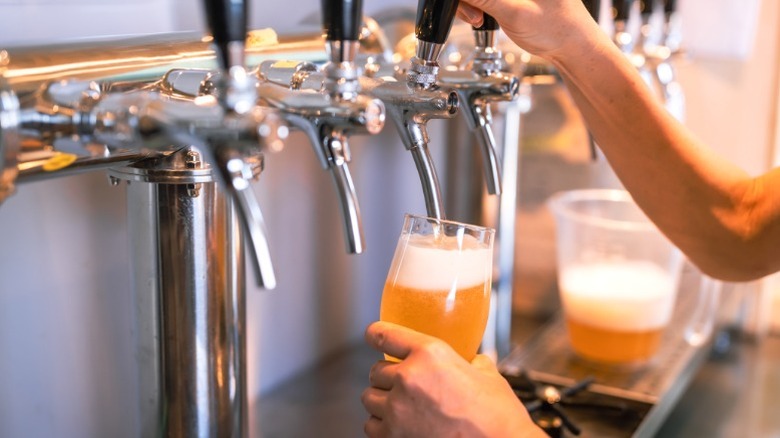The Best Beer To Pick For Your First Homebrew Batch
Maybe you've never given much thought to brewing your own beer at home. After all, you can go right to the store and buy a twelve-pack whenever you want. The good people at Anheuser-Busch have a lot more practice making beer than you do. But there's more to life than simple convenience.
If you live someplace where homebrewing is legal (if we have any readers from the Faroe Islands, we're afraid you're out of luck), it can be a great way to produce something you're proud of while also offering more control over what goes in your beer. Which beer should you make to start, though? To find out, we talked to Matthew Campion, the co-founder of Long Island's own Lunchbox Brewing Company, who advises first-time brewers to take things easy at the beginning of their journey.
"Start with a simple ale," Campion told The Takeout. "This can be a pale ale, amber, or even a porter. These styles are more forgiving of small mistakes and don't require precise temperature control like lagers do." It's always nice to have an entry-level option for a beginner in any hobby. Dark ales in particular are a solid choice because the roasted malt flavor has a way of making up for an otherwise shaky first batch. Plus, they taste pretty great, making them a good option for anyone who wants to actually enjoy the fruits of their labors.
How to tell if your ale came out right
So, you've made your first ale, whether that's an American pale ale or a hearty stout (a misunderstood beer if there ever was one). How can you tell if you made it right? According to Campion, it's simple. "You'll know you brewed a good batch if the beer tastes clean, balanced, and close to the commercial version of that style." Just like how a novice baker will know they've made it once their chocolate chip cookies taste better than the Pillsbury cookie dough you buy from the supermarket, you can tell if your ale came out right if it tastes as good or better than the brews your local bar has on tap. If it doesn't taste the same as what you're used to, that's okay. Different recipes create different flavors. Try new recipes out until you find one you really enjoy.
Really, your criteria for evaluating your own beer shouldn't be too different from what you use to evaluate other beers. But you should give yourself a little leeway, given how much money it takes to make commercial beer. How does it look? How does it smell? Does it taste good? Do you want to drink more of it? If you get all the right answers to these questions, you can give yourself a pat on the back and enjoy your homebrewed ale.

